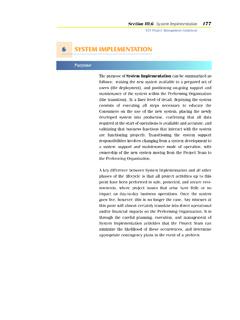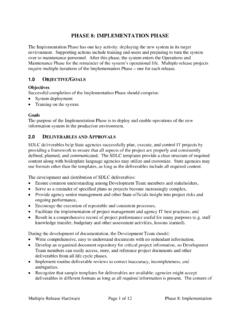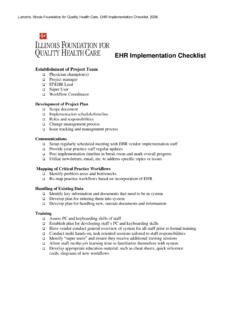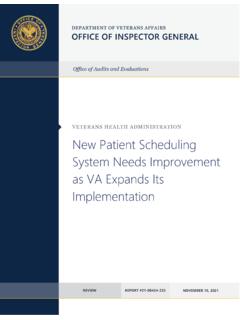Transcription of Educational policies and problems of implementation in …
1 242 Diane Phillips and Barbara HayesAustralian Journal of Adult LearningVolume 46, Number 2, July 2006in education with research over the past two decades. Appointed as the Foundation Head of School and Professor of Nursing at James Cook University in 1989, Barbara has worked closely with those in Indigenous and rural health and in education. Contact detailsDiane Phillips, Course Coordinator, Graduate Diploma of Midwifery/Master of Midwifery, Deakin University, Faculty of Health and Behavioural Sciences, School of Nursing, 221 Burwood Highway, Burwood, Victoria, 3125 Tel: (03) 9244 6119 Fax: (03) 9244 6159 Email: policies and problems of implementation in NigeriaN. S. OkoromaRivers State University of Science and TechnologyNigeriaThe poor performance of the education sector in Nigeria has become very worrisome. What is the problem? Is the Educational policy faulty or is it the implementation that is faulty?
2 What are the implications for national development? These are the issues explored in this paper, based on a literature review approach. The fi ndings blame the distortions in the Educational system on the ineffective implementation engendered primarily by lack of political will, lack of continuity of programs, and corruption. The situation has hindered national development and, until urgent action is taken to review Nigeria s Educational system, its national aspirations will continue to be compromised. The paper recommends the discontinuation of the National Policy on Education fashioned after the American system and the adoption of the model practised by Asian countries such as Japan, China and India which takes the culture of the people into consideration. In addition, the 244 OkoromaEducational policies and problems of implementation in Nigeria 245provision of qualitative education should be made compulsory and entrenched into the Constitution in order to encourage result-oriented implementation .
3 Sustained political will and eradication of corruption are necessary for effective policy education as in other fi elds of human endeavour, every offi cial action of an organisation must have a backing or a basis. It is this purpose that a policy serves. A policy defi nes the area in which decisions are to be made, but it does not make the decision. It usually provides a general guide that facilitates decision-making. Educational policies provide the direction for Educational formulation of an Educational policy sets the stage for implementation which, according to Ukeje (1986), is perhaps the most important aspect of planning. Planning is usually an action which succeeds policy formulation but precedes implementation . Unfortunately, Educational policies and goal attainment have been irreconcilable due to implementation constraints. Perhaps this accounts for the observation made by Governor Oyakhilome of Rivers State in an address sent to the Convention of the Nigerian Association for Educational Administration and Planning in 1986.
4 He expressed concern about the problem of policy implementation thus:We know it is diffi cult to realize planned objectives one hundred percent. But our experience in planning education in this country shows a disturbing gap between planned objectives and attained results .. As professionals in the fi eld of education, it may be pertinent to identify whether those critical gaps are results of faulty planning or faulty implementation (Oyakhilome 1986:2).Policy implementation in education is a conspicuous national problem that has taken centre stage in Nigeria. This paper examines the problem in some detail and explores its implications for the development of of the problemOver the years, the gap between Educational policies and goal attainment due to inadequate implementation of these policies has become of great concern to many observers. The paper is interested in identifying the implementation constraints and to explore the implications of poor Educational policy implementation for national development.
5 Following a clarifi cation of the causes and effects of the problem of poor policy implementation , the paper will advance remedial questionsIn course of this examination, the following questions will be addressed. Are Educational achievements in line with Educational policies in Nigeria? What factors or constraints have made the implementation of Educational policies diffi cult? What are the implications of poor implementation of Educational policies for national development? What strategies can be adopted to ensure better policy implementation ?Policy as a conceptA policy serves the purpose of ensuring that every offi cial action of an organisation must have a basis or a backing. Terry (1977: 1989) considers that a policy is an overall guide that gives the general limits and direction in which administrative action will take place . According to him, a policy defi nes the area in which decisions are to be made but it does not give the decision.
6 246 OkoromaEducational policies and problems of implementation in Nigeria 247A policy brings about a meaningful relationship between business objectives and organisational functions as it discourages deviations from planned courses of action. A policy ensures consistency of action because an organisation is governed by approved principles. A policy does not have to be rigid, as there should be room for adjustment if necessary after its this is why Hoy and Miskel (1978:215) believe that policies are not only formulated but also programmed, communicated, monitored and evaluated ? The non-rigid nature of policies is confi rmed by Lindblom (1959:86) when he describes policy-making as a process of successive approximation to some desired objectives in which what is desired itself continues to change under reconsideration . In fact, a good policy is one that can be reviewed as the need may arise.
7 Lindblom believes that a wise policy maker cannot expect all their policies to achieve a one-hundred percent success. Regardless of how good a policy may be, its implementation may introduce some element of concept of Educational policyEducational policies are initiatives mostly by governments that determine the direction of an Educational system (Okoroma 2000:190). According to Osokoya (1987:2):Education is a distinctive way in which the society inducts its young ones into full membership. So every modern society needs some Educational policies to guide it in the process of such the view of Awokoya (1981), Educational policy is directed towards increasing the quality of life of a people. He believes that the objective of any policy is to satisfy individual needs, community pressures and the degree of complexity and sophistication to which socialised personnel must be educated and trained to meet these demands.
8 The following considerations, according to Awokoya (1981), are necessary to guide the formulation of adequate Educational policy. It should be formulated and adopted through a political process which acknowledges the reality and legitimacy of confl icting interests and desires among its participants It should portray some elements of guidance for properly directed and coordinated action towards the attainment of the desired goals It should contain information on the broad objectives that should be reached It should be a binding guide on the actions of those implementing it It should be enforceable and enforced by the society which formulates (1976) believes that, for a policy to qualify as an Educational policy, it must be distinct from other policies . In his view, Educational policies are distinguishable from other policies by the fact that policies on education are part and parcel of Educational institutions.
9 However, it is important to note that not all policies formulated in Educational institutions can qualify as Educational po1icies. Generally, policies must be rational and purposeful to enable them to stand the test of associated with policy implementationThe gap that often exists between policy formulation and implementation provokes inquiry to identify factors that constrain the effective implementation of Educational policies . The problem of policy implementation is traceable to the planning stage which comes immediately after policy formulation. Okeke et al. (1985) and Ukeje (1986) have stated clearly that good planning will ensure effective implementation . Good planning that can facilitate effective implementation ought to consider such factors as the planning environment, social environment, political environment, and fi nancial and statistical problems . It is in recognition of this observation that Aghenta (1984: 239) noted:For education to achieve all ends, it has to be carefully planned.
10 The plan must take into consideration .. the needs 248 OkoromaEducational policies and problems of implementation in Nigeria 249of the society; the political, socio-cultural, economic, military, scientifi c, and technological realities of the environment are very important to its (1977) notes that planned implementation is constrained by the following factors: over-estimation of available resources this is a situation where estimated resources are greater than actual available resources to implement a program under-estimation of the costs of implementing a plan this happens when cost-estimates do not make adequate provisions for infl ation and actual implementation costs become unmanageable over-reliance upon external assistance plans that substantially rely upon assistance from foreign sources for their implementation run into hitches when such aid fails to come, and inaccurate statistical data planning education requires accurate and up-to-date data.
















